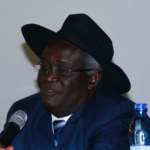
The Minority in Parliament has pushed back against recent remarks made by Professor Kwamena Ahwoi, former Minister for Local Government, describing aspects of his submission on Ghana’s decentralisation process as inaccurate and misleading.
Prof Ahwoi, a long-standing advocate for decentralisation, had argued at the National Dialogue on Decentralisation and Responsive Governance that the creation of new districts and regions in recent years amounted to an “overreach” and was counterproductive to effective local governance.
But in a strongly worded response, the Minority insisted that decentralisation must be understood as more than maintaining existing governance structures.
“Decentralisation is about bringing government closer to the people and ensuring equitable development across the country. The creation of new districts and regions was, and remains, a deliberate policy choice to extend the reach of government, empower local structures, and enable previously underserved areas to directly receive attention and resources,” the statement said.
New Regions Not an Overreach
Addressing Prof. Ahwoi’s claim that Ghana had “survived with ten regions for over five decades” and therefore did not need the six new regions created between 2018 and 2019, the Minority dismissed the argument as a misreading of policy intent.
“The question was never about mere survival. It was about facilitating growth, inclusion, and accelerated development,” the statement explained, adding that the new regions had already opened up opportunities for infrastructure, social services, and investment that were previously constrained.
On Population Requirements
The Minority also challenged Prof. Ahwoi’s suggestion that successive presidents had ignored population requirements in creating metropolitan, municipal, and district assemblies (MMDAs).
“Every MMDA that was created, at least under the NPP administration, satisfied the population thresholds and economic viability requirements enshrined in the Local Governance Act, 2016 (Act 936). The process was undertaken with due regard to the law, not partisan convenience,” the statement argued.
Tangible Benefits of New Regions
Highlighting the impact of the six newly created regions, the Minority pointed to what it described as “monumental developments” achieved in record time.
These, it said, included the establishment of fully functional Regional Coordinating Councils, departmental structures for education, health, agriculture and highways, as well as new regional offices for security agencies such as the Police, Immigration, Fire and Prisons Services.
“Over 60 significant developments of varying scale were completed under the Akufo-Addo administration. These projects are not theoretical; they are functional, operational, and in daily use by citizens,” the statement emphasised.
Concerns Over Dialogue Framing
The Minority further suggested that the platform on which Prof. Ahwoi made his comments was politically skewed.
“While the programme was couched in the language of ‘resetting decentralisation,’ the framing and theme appear politically motivated, designed to advance the agenda of the ruling party rather than provide a neutral platform for a balanced national dialogue,” the group noted.
Commitment to Decentralisation
Concluding, the Minority reaffirmed its commitment to Ghana’s decentralisation agenda as a dynamic process aimed at deepening governance, empowering communities, and expanding opportunities for development.
“The creation of new districts and regions is not an overreach; it is an investment in inclusion and nation-building,” the statement signed by Hon. Francis Asenso-Boakye, Ranking Member on the Parliamentary Committee on Local Government and Decentralisation, said.